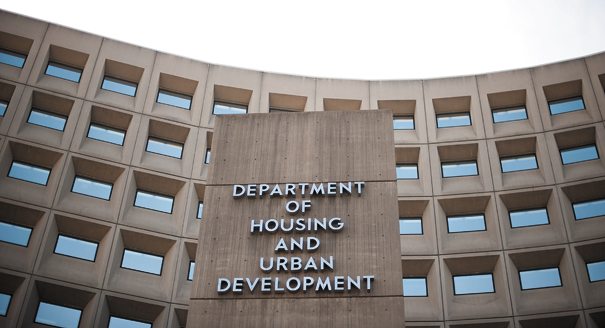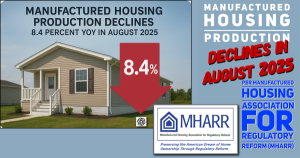[vc_row][vc_column][vc_column_text]SERIOUS ISSUES SURFACE IN RUN-UP TO NEW MONITORING CONTRACT
On November 16, 2017, HUD took the first step toward the solicitation and procurement of a new manufactured housing “monitoring” contract in 2018, by holding an “industry day” forum for potentially interested contract offerors, but the agency presentation immediately exposed serious continuing bias within the contracting process, while also raising major questions regarding impending changes to the structure of the contract monitoring  function.
function.
The contract monitoring function has been the focal point of egregious procedural and substantive abuses during the history of the federal manufactured housing program. Designed to be a competitive procurement for non-discretionary, ministerial assistance to HUD in assuring the proper performance of design approval and production inspection functions by state and private Primary Inspection Agencies (PIAs), as set forth in the Department’s manufactured housing Procedural and Enforcement Regulations (24 C.F.R. 3282), the monitoring contract – through contract award criteria tailored to favor the incumbent contractor — has instead become a de facto sole-source procurement, held by one-and-only-one contractor (albeit under different corporate names), for over forty years.
In addition, the role of that single contractor – as MHARR has extensively detailed in previous reports and analyses – has expanded and grown over the course of time, to now encompass de facto discretionary functions and activities that significantly exceed any statutory grant of authority, unnecessarily increase the cost of manufactured housing without corresponding benefits for consumers, and effectively involve improper and unlawful delegations of governmental authority to a private entity.
Congress, through the Manufactured Housing Improvement Act of 2000, sought to remedy these abuses – and their consequences – by, among other things: (1) specifically defining and limiting the “monitoring” function to mean “the process of periodic review of the primary inspection agencies … for the purpose of ensuring that [they] are discharging their” statutory duties; (2) requiring HUD to “ensure that separate and independent contractors are retained to carry out monitoring and inspection work and any other work that may be delegated to a contractor” under federal law; and (3) prohibiting any fee collected under its authority from being used “for any purpose or activity not specifically authorized” by federal manufactured housing law, “unless such activity was already engaged-in by [HUD] prior to the date of the enactment of the Manufactured Housing Improvement Act of 2000.”
All of these statutory changes were designed and intended to both ensure full and fair competition for the program monitoring contract and to restrict “monitoring” to its original purpose – i.e., allowing HUD to ascertain whether the state and private PIAs are performing their statutorily-mandated inspection functions.
During the four-year tenure of the current program administrator (and for years before), however, these restrictions, limitations and safeguards have been serially and summarily ignored, as the de facto monopoly of the 40-year program contractor has been maintained and its functions have been extended and expanded beyond all previous boundaries, with the contractor effectively exercising extensive and unlawful pseudo-governmental discretionary authority, with HUD acting as a de facto rubber-stamp for the erstwhile monitoring contractor.
And now, with the current monitoring contract set to expire in August 2018, HUD is once again set to put its “thumb on the scale” in order to favor and create a bidding advantage for its 40-year incumbent contractor. Specifically, as with past monitoring contract procurements, HUD has announced its intention to conduct a highly-truncated and unnecessarily rushed bidding process that will significantly advantage its incumbent contractor, while imposing extreme and unnecessary burdens on other bidders to prepare and submit a responsive bid package.
Specifically, for a contract that during its last five-year term (with options) was valued in excess of $25 million, HUD is expecting to issue a solicitation package just before the end of the current year – i.e., December 29, 2017 – with responses from offerors due just 22 days later, on January 19, 2017. With weekends and federal holidays (i.e., January 1, 2018) removed, this will leave bidders just 15 business days to analyze and digest the extensive bid package (which could be different – either in whole or in part – from any materials distributed in advance of the official Request for Proposals (RFP) published in the “Federal Business Opportunities” directory) and submit an equally-extensive proposal in order to even be competitive with a 40-year incumbent contractor. HUD’s contracting officer, when challenged by MHARR to show the need for such a shortened bid period, offered no specific rationale.
Even worse, the monitoring contract, for reasons that were similarly not explained, is expected to be split into two solicitations and contracts, with DAPIA oversight under one contract and IPIA/SAA oversight under a separate contract (with bidders permitted to bid for either one or both contracts). This will have the de facto impact of making it more costly, particularly for non-incumbent offerors, to bid – i.e., developing and submitting two complete bid packages rather than one – and more difficult and burdensome for those non-incumbent offerors to develop and submit two bid packages within an unnecessarily truncated and limited bid response period.
With new Trump Administration officials beginning to arrive at HUD, MHARR will immediately object to any such artificially-truncated or distorted bidding process for the monitoring contract (or contracts) and will take all necessary and appropriate steps to seek a monitoring contract bidding process that, for once, is fair, open and equally accessible to all potential bidders.[/vc_column_text][/vc_column][/vc_row]













